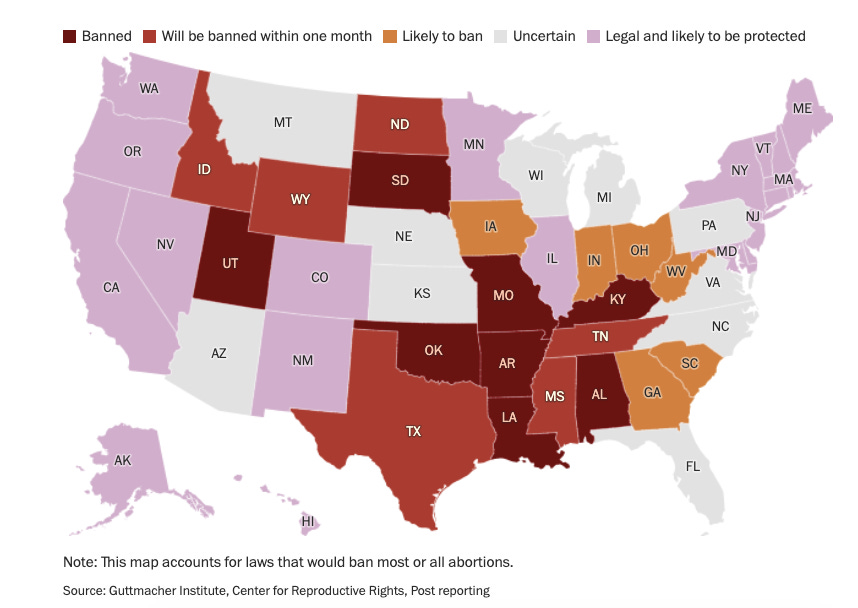Sree’s newsletter is produced with Zach Peterson (@zachprague). The NYT front page on the left is from the day after the Supreme Court overturned Roe. The one on the right is from 1973, the day after Roe became the law of the land.
🗞 #NYTReadalong: This week’s guest was New York Times for Kids Editorial Director Amber Williams. You’ll find the recording, along with two years’ worth of archives at this link. The Readalong is sponsored by Muck Rack. Interested in sponsorship opportunities? Email sree@digimentors.group and neil@digimentors.group.
📺 My Digimentors team is working with companies and nonprofits around the world to create virtual and hybrid events. We’ve worked on events for 50 people and 100,000. See our updated brochure. Please talk to us if you need events help or social media consulting (no project too small or too big): sree@digimentors.group and neil@digimentors.group.
***
THEY HAVE DONE WHAT THEY SAID THEY WERE GOING TO DO. Abortion is now all but illegal in America, and the Supreme Court will not stop there.
The “alarmists” and those “overreacting” were right, and have been right for the last couple of decades.
Those saying that “they’ll come for trans and gay rights next,” are well behind the curve — that’s already happening, and there’s no good reason to think that same-sex marriage, adoption, and any number of other things aren’t in dange. Clarence Thomas — Supreme Court Justice, alleged sex offender, and spouse to an insurrectionist — said as much in his written opinion.

Roe wasn’t really a decision about abortion, it was rooted in a right to privacy that covered abortions. That right to privacy is now gone, and abortions are illegal in several states, and likely to made so in many others.
With new abortion restrictions comes enforcement, and it’s only logical that it will be the police and other state law enforcement agencies will be the ones to do the enforcing. The problems with this are myriad and self-evident, and I won’t even bother listing them.
It’s easy, and glib, to say things like, “rich white women will be able to just get abortions wherever,” but that sort of reductionism only makes things worse. This decision, and Congress’s inability and unwillingness to take meaningful legislative action, represents the apex of the minority rule doctrine that the GOP has been living by since (at least) the first Clinton administration.
Five of the sitting justices on the Supreme Court were appointed by presidents who did not win the popular vote. And, in the process, the court has lost its legitimacy. Don’t just take my word for it as you might think I’m an alarmist. Here’s a thoughtful, calm person instead.


The decision also, for the millionth time, lays bare just how nonexistent the social system is in this country. We have no national policy for maternity/paternity leave, children’s health, free lunches, or any other meaningful support for children in the real world.


Think way back, all the way back to nine months ago, when MAGA folks were disrupting cultural markers like Applebees and Olive Garden, and airport waiting areas, to proclaim to the world that vaccine and mask mandates were an affront to America, and “the government can’t tell us what do.”
Now, unsurprisingly, it’s crickets. That’s because it’s not about some abstract concept like “freedom” — it’s about control.
George Carlin was right, and the only thing that’s happened between when he recorded this special (in 1996) and now is that Christian fundamentalism has become more influential in every level of our political environment.
- Sree / Twitter | Instagram | LinkedIn | YouTube / Cameo
A word from Armory Square Ventures
Business journalist Elizabeth MacBride recently interviewed ASV Partner and Co-founder Pia Sawhney about venture capital, the genesis of Armory Square Ventures and current prospects and opportunities for women-led businesses across the country.
Take a look at Elizabeth's article in Forbes, and at the original video interview she conducted with Pia for Times of Entrepreneurship, a journalism initiative highlighting stories about business beyond Silicon Valley. The Times of E is sponsored by the Ewing Marion Kauffman Foundation, the Walton Family Foundation and MIT’s Legatum Center for Entrepreneurship & Development.
Elizabeth has been tracking American small business owners for some time and co-authored a book on the topic titled The New Builders with venture capitalist Seth Levine, Co-founder of Foundry Group. The book highlights how American entrepreneurs and founders operating today are increasingly female, older, and hail from an ethnic minority group. It offers a telling portrait of what American entrepreneurship truly looks like and our team learned a good deal from their visit to Syracuse earlier this spring.
Tech Tip w/ @newyorkbob: Microsoft Bids a Fond Farewell to Internet Explorer
By Robert S. Anthony
Each week, veteran tech journalist Bob Anthony shares a tech tip you don’t want to miss. Follow him @newyorkbob.
Chances are pretty good that you’re reading this via Google’s Chrome or Apple’s Safari web browser. Turn back the clock 20 years, however, and you might have been using Microsoft’s Internet Explorer, the gold standard of the early web.
Unfortunately, like the old CompuServe online service and Wang office computers, Internet Explorer (IE for short) had a long, storied run, but in the end couldn’t keep up with newer, faster competition. As of June 15, the venerable web browser has been retired by Microsoft.
Of course, this comes as no surprise to anyone who has actually used IE recently. Compared to newer web browsers like Chrome and Safari, IE is slow, cranky and downright unreliable. Even Microsoft itself admitted that IE’s best days were behind it.
“Internet Explorer’s reputation today is, deservedly, one of a product from an older era—quirky in behavior and lacking the security of a modern browser,” said Microsoft’s Sean Lyndersay in a June 15 Microsoft blog to mark IE’s retirement. As younger browsers, including Microsoft’s own Edge launched in 2015, overtook it in terms of speed and popularity, the end of the line for IE became clear.
As of May, Chrome held almost 65 per cent of the global browser market, according to StatCounter, while Safari was at just above 19 per cent. Edge shows up at just under 4 per cent but then you need to read past Firefox, Samsung Internet, Opera, UC Browser and Android on the StatCounter chart before IE turns up at just 0.64 per cent market share.
Internet Explorer has had a checkered legal history. In 1998, the US Justice Department filed an antitrust suit against Microsoft because, in part, it was forcing PC makers to install IE in their PCs if they wanted to install Microsoft’s popular Windows 95 operating system in their machines. No IE, no OS.
This requirement put Netscape, the top web browser at the time, over the proverbial barrel since most PC makers did not want to run afoul of Microsoft and not be able to get Windows 95 or the upcoming Windows 98 OS. In the end Microsoft indeed found a way—after a legal settlement—to allow other web browsers to work nicely with Windows.
If you use old or proprietary software or have to use an old website written specifically for IE, note that Microsoft Edge comes with an “IE mode” which should be compatible with most IE-specific needs, according to Microsoft.
Internet Explorer introduced many of a certain age to the web, online banking and many other internet features and for that it earns the respect of legions of veteran web surfers. But like an old baseball legend whose skills have waned, IE’s retirement is well earned and not a moment too soon.
❓Did we miss anything? Make a mistake? Do you have an idea for anything we’re up to? Let’s collaborate! sree@sree.net and please connect w/ me: Twitter | Instagram | LinkedIn | YouTube / Cameo.








